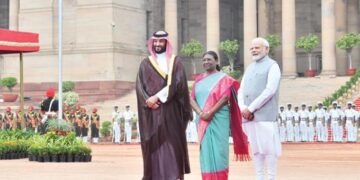 NEW DELHI: In a significant diplomatic rendezvous on September 11, India and Saudi Arabia unveiled a series of strategic initiatives aimed at fast-tracking Riyadh’s ambitious $100-billion investment blueprint for India. The comprehensive investment scheme encompasses a colossal refinery project among its highlights.
NEW DELHI: In a significant diplomatic rendezvous on September 11, India and Saudi Arabia unveiled a series of strategic initiatives aimed at fast-tracking Riyadh’s ambitious $100-billion investment blueprint for India. The comprehensive investment scheme encompasses a colossal refinery project among its highlights.
Crown Prince Mohammed bin Salman, during his State visit, engaged in discussions with Prime Minister Narendra Modi spanning various sectors, including energy and defence. The two leaders also reiterated their commitment to the newly-inaugurated India-Middle EastEurope Economic Corridor (IMEC).
Day-long State visit
The Crown Prince, who is also Saudi Arabia’s Prime Minister, embarked on day-long State visit following his participation in the G20 Summit. The visit commenced with a ceremonial welcome at Rashtrapati Bhavan, followed by the co-chairing of the inaugural meeting of the Strategic Partnership Council, the highestlevel body responsible for overseeing bilateral relations.
Earlier in the day, the Crown Prince attended a ceremonial reception at Rashtrapati Bhavan, where he met President Droupadi Murmu and Prime Minister Narendra Modi, among others.
During the meeting, Prime Minister Modi emphasised the critical importance of Saudi Arabia as a strategic partner for India. He highlighted the significance of their cooperation, given their status as the world’s largest and fastestgrowing economies, stressing its role in maintaining regional peace and stability.
Cooperative relations
Crown Prince Mohammed, while elaborating on the IMEC initiative, stressed the necessity for meticulous and concerted efforts to translate this visionary project into a tangible reality. He emphasised the longstanding tradition of cooperative relations between India and Saudi Arabia, underpinned by a shared objective of creating opportunities and fostering harmony.
Both leaders acknowledged the substantial agenda for cooperation, particularly in sectors like waterways, ports, railway expansion, highway infrastructure, energy, hydrogen, and gas grids. They also committed to fast-track negotiations for a free trade agreement between India and Gulf Cooperation Council as a catalyst for economic collaboration.
The visit culminated in the signing of eight agreements, including one led by the energy ministers to broaden the hydrocarbons relationship into a comprehensive energy partnership. This partnership will encompass renewable energy, petroleum, electricity, green hydrogen, and strategic petroleum reserves.














 G20 podium
G20 podium

